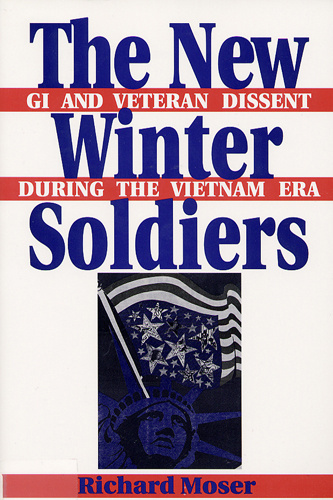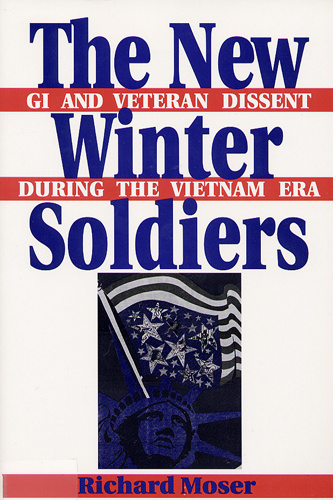The New Winter Soldiers
GI and Veteran Dissent During the Vietnam Era
Richard Moser uses interviews and personal stories of Vietnam veterans to offer a fundamentally new interpretation of the Vietnam War and the antiwar movement. Although the Vietnam War was the most important conflict of recent American history, its decisive battle was not fought in the jungles of Vietnam, or even in the streets of the United States, but rather in the hearts and minds of American soldiers. To a degree unprecedented in American history, soldiers and veterans acted to oppose the very war they waged. Tens of thousands of soldiers and veterans engaged in desperate conflicts with their superiors and opposed the war through peaceful protest, creating a mass movement of dissident organizations and underground newspapers.
Moser shows how the antiwar soldiers lived out the long tradition of the citizen soldier first created in the American Revolution and Civil War. Unlike those great upheavals of the past, the Vietnam War offered no way to fulfill the citizen-soldier's struggle for freedom and justice. Rather than abandoning such ideals, however, tens of thousands abandoned the war effort and instead fulfilled their heroic expectations in the movements for peace and justice. According to Moser, this transformation of warriors into peacemakers is the most important recent development of our military culture.
The struggle for peace took these new winter soldiers into America rather than away from it. Collectively these men and women discovered the continuing potential of American culture to advance the values of freedom, equality, and justice on which the nation was founded.
Not only does Moser show the hidden depths and the extent of the anti-war movement among American G.I.s during the Vietnam War, but he also offers us a new way to read that movement. This is a finely tuned blend of anecdote and interpretation.
Moser has given us much more than an eye opening Vietnam War book. The New Winter Soldiers also demands serious attention from all of us trying to make sense of the rocky histories of American masculinized citizenship and militarized masculinity.
Moser has written an important story of transformation. He provides a detailed description of ways in which pain became a source of insight and action, 'how thousands of American soldiers and veterans created something good from what was one of the worst experiences of their lives.' The book will contribute to our knowledge not only of the Vietnam War but of broader human struggles to cope with, and ultimately contest, war-making.
A vigorous analysis of the protest movement among veterans as well as within the military establishment. . . . Highly recommended.
Introduction
1 Happy Veteran's Day
2 The Soldier Ideal and American Culture: The Citizen-Soldier, the Fighter, and the Fifties
3 GI Dissent and War Resistance in Vietnam
4 The GI Movement in the United States
5 The Veterans' Antiwar Movement
6 Military Resistance as a Social Movement
7 The Transformation of the Citizen-Soldier: War and Reconstruction
Notes
Sources
Index






